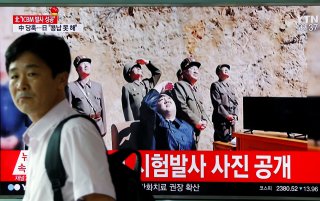Kim Jong-un Might Be Dead—So Who Controls His Nuclear Weapons?
The National Interest talked North Korea, history, and populism with Professor Alex Wellerstein.
That kind of thing is very troublesome given that that part of the world is not extremely stable, the government of India has been doing rather more extreme things in the last two years, the Pakistanis have a long history of doing extreme things as well...
I will say, the countries I worry the most about—one of them is North Korea, because they don't have a history of great judgement, and they are in a threatened position, and countries that feel threatened can react just like an animal in a corner...
And I worry about the United States, because it does not feel to me because the United States is pushing in the direction that it used to push in. It does not seem interested in arms control. It does not seem interested in de-escalation. It does not seem interested in pushing global norms and encouraging nonproliferation.
All of these things that throughout the Cold War and over the course of the 21st century, the United States was a leader in, in many of them it seems to have reversed its position entirely, and at best is not paying attention to these things of things.
I'm worried that we will end up in a world that will look very different from the Cold War, which was not the best of all possible worlds, but it had some stability to it. I worry that the policies that we're pursuing now may encourage other nations to develop nuclear weapons within our lifetimes, and in some situations, which are not far-fetched, may even result in nuclear use.
I hope I'm a hundred percent wrong!
Given the past three years of a lot of systems around the world not functioning as they're supposed to, and a lot of leaders exhibiting irrational behavior, what do you think the big number one takeaway for the U.S. and nuclear weapons should be?
I have a number of big takeaways.
One is that we live in a too dangerous, complicated, changing world to not have more policy being guided by expertise. That's not just for the United States. That's also the UK. That's also India.
There are a lot of countries shifting in a direction where expertise is seen as suspicious and and you can rule with your gut, that low-brow populism is a good approach. That's very dangerous.
We have a lot of threats out there, and we don't have an infinite amount of time to deal with them.
Some of them are going to come up, and the pandemic stuff is one example of this. People have been talking about pandemics for a very long time, not just the last two years. People have been worried about pandemics for decades...
The other things I would say about nuclear weapons in particular—this is not a direct reference to Trump, I actually think this is a nonpartisan statement—but for somebody who a lot of people, including his supporters, believe is not always on top of information, is often unpredictable, is going with his gut—some people see this as a positive sign.
Either way, you don't want to have one human being in charge of this kind of decision.
Even if the person you elect, or who takes power, is totally rational, listens to the experts, even if it's the most boring, bland person you can imagine, who's not going to do anything weird when you elect them, over the course of a presidency, people change, in the way people change all the time.
There's a million ways, and we see this in history quite a bit, in which people end up becoming different. They can be impaired in a million different ways, whether it's medical, related to substances, or related to stress, or aging, or anything.
I really fear individual people. Individual people are hard to predict. People in groups, you can make some rough predictions on them. There's also downsides to that, but an individual person, you can't predict that well.
When you're talking about something as potentially fateful as nuclear weapons, that's very scary. I would want at a bare minimum—a bare minimum!—for any President that you can imagine, I would want at least one other person to have to sign off on the thing, and have the full ability to say, "no I just don't think it's a good idea."
If you can't get one other person—and you can pick the person—if you can't get one other congressional-approved person to say, "yes, this sounds like a good idea," then I don't think you should do something.
Matthew Petti is a national security reporter at the National Interest. Follow him on Twitter: @matthew_petti.

